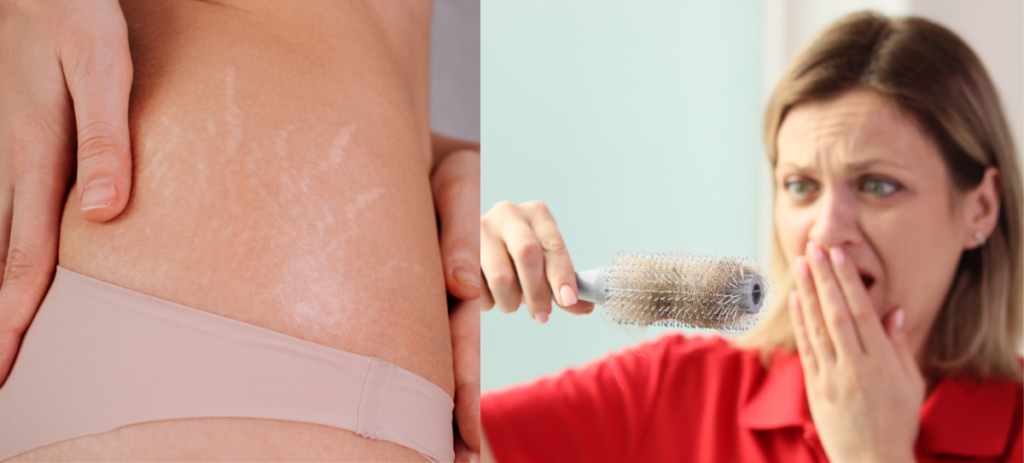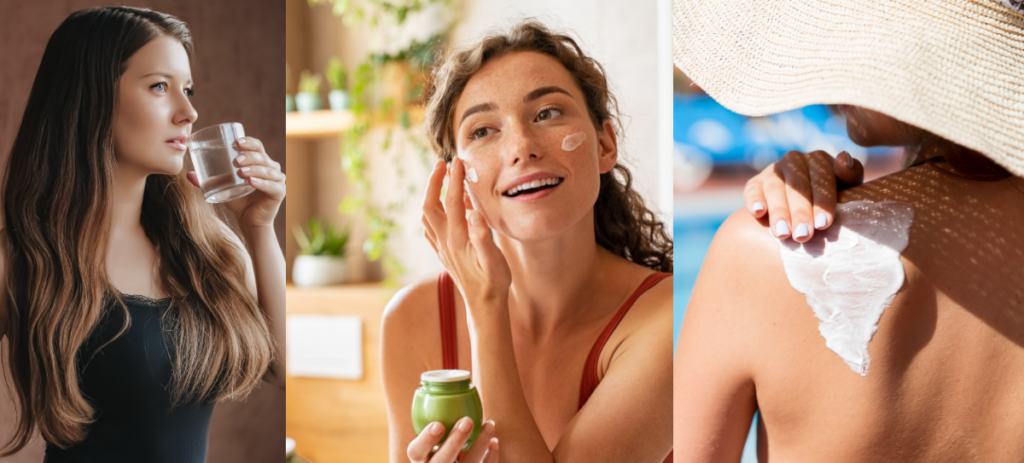Introduction
Entering the realm of motherhood is a profound and transformative experience, marked not only by the joy of new life but also by significant changes in one’s body. Among these changes, hair and skin health shifts are common experiences for many women during the postpartum period. In this journey, I’ll share the personal experiences of some new moms, struggles, and strategies for navigating postpartum hair and skin care.

Understanding Postpartum Changes:
Hair Loss
Postpartum hair loss, also known as Telogen Effluvium or Anagen Effluvium, occurs due to hormonal fluctuations after childbirth. It’s a natural process where hair that would typically shed over nine months accumulates and falls out in a shorter period, typically around three to six months postpartum 1.
Skin Changes
Pregnancy hormones can affect skin elasticity, pigmentation, and oil production 2. Common skin issues during the postpartum period include acne flare-ups, stretch marks, and changes in skin texture 3.

Coping with Postpartum Hair Loss:
Acceptance
Understanding that postpartum hair loss is a temporary phase can alleviate anxiety. Recognizing that it’s a common experience for many new mothers can provide comfort.
Gentle Hair Care
Opting for gentle hair care products, avoiding tight hairstyles, and minimizing heat styling can help reduce hair breakage and further damage.
Nutritious Diet
Consuming a balanced diet rich in vitamins and minerals, particularly those essential for hair health like biotin, zinc, and iron, can support hair growth and strength 4.
Patience
Hair regrowth takes time. Embracing shorter hairstyles or experimenting with accessories like scarves or headbands can help in the transitional phase.
Nurturing Postpartum Skin
Hydration
Drinking plenty of water helps maintain skin hydration from within 5. Using moisturizers with ingredients like hyaluronic acid and glycerin can further replenish moisture.
Sun Protection
Protecting the skin from harmful UV rays is crucial, especially if dealing with pigmentation changes. Using a broad-spectrum sunscreen daily can prevent further darkening of existing spots.
Skincare Routine
Simplifying skincare routines with gentle cleansers, moisturizers, and targeted treatments for specific concerns can help manage postpartum skin issues effectively.
Self-Care
Taking time for self-care activities like gentle massages, warm baths, or indulging in skincare rituals can provide relaxation and enhance overall well-being.
Seeking Support
Professional Guidance
Consulting dermatologists or healthcare providers for personalized advice and treatment options tailored to individual needs can be beneficial.
Peer Support
Joining online communities or support groups where mothers share their postpartum experiences can offer solidarity, advice, and encouragement.

Conclusion
The postpartum period is a unique journey filled with both challenges and joys. Understanding and addressing changes in hair and skin health with patience, self-care, and support makes it possible to navigate this transformative phase with grace and confidence. Remember, prioritizing self-care is not only essential for physical well-being but also for nurturing the mind and spirit during this special time of transition into motherhood.
We’d love to hear about your own postpartum hair and skin care experiences. Share your journey, struggles, and triumphs in the comments below. Your insights may offer comfort, advice, and encouragement to fellow mothers navigating similar challenges. Together, let’s build a supportive community where we can uplift and empower one another through this beautiful journey of motherhood.
Referecnes
- Yin GO, Siong-See JL, Wang EC. Telogen Effluvium–a review of the science and current obstacles. Journal of Dermatological Science. 2021 Mar 1;101(3):156-63.
- Putra IB, Jusuf NK, Dewi NK. Skin changes and safety profile of topical products during pregnancy. The Journal of Clinical and Aesthetic Dermatology. 2022 Feb;15(2):49.
- Rajab F. Managing postpregnancy hormonal skin issues in breastfeeding women. Dermatology Times. 2022 SEP 15;43(9).
- Aparicio E, Jardí C, Bedmar C, Pallejà M, Basora J, Arija V, ECLIPSES Study Group. Nutrient intake during pregnancy and post-partum: ECLIPSES study. Nutrients. 2020 May 7;12(5):1325.
- Zainal NZ, Nor NA, Azman MI, Zainudin NA, Mustapa SS, Mohamed R, Ganesalingam M, Mokhtar RH. Evaluation of hydration status and fluid intake among low-risk postpartum women in local community delivered in Hospital Ampang.